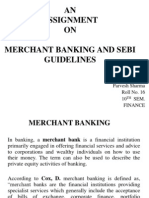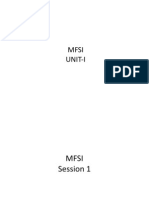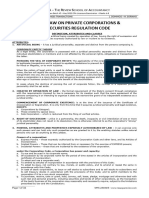Capital Market Analysis and Corporate Laws: Merchant Bankers Short Notes
Capital Market Analysis and Corporate Laws: Merchant Bankers Short Notes
Uploaded by
Gagan PreetCopyright:
Available Formats
Capital Market Analysis and Corporate Laws: Merchant Bankers Short Notes
Capital Market Analysis and Corporate Laws: Merchant Bankers Short Notes
Uploaded by
Gagan PreetOriginal Description:
Original Title
Copyright
Available Formats
Share this document
Did you find this document useful?
Is this content inappropriate?
Copyright:
Available Formats
Capital Market Analysis and Corporate Laws: Merchant Bankers Short Notes
Capital Market Analysis and Corporate Laws: Merchant Bankers Short Notes
Uploaded by
Gagan PreetCopyright:
Available Formats
Capital Market Analysis and Corporate Laws
Paper 11
MERCHANT BANKERS SHORT NOTES
Date/ Time / version
South Indian Regional Council for ICWAI
CLASSIFICATION OF MERCHANT BANKERS
All Merchant Bankers must compulsorily register with SEBI, which has classified under 4 categories.
Issue Management
Prospectus Financial Structure Tie up of Finances Allotment of Securities Refund of subscription
(contd..)
CLASSIFICATION OF MERCHANT BANKERS
(contd..)
Underwriters
Advisory Consultancy
Co-manager
Portfolio manager
Consultants to issue
Mobilization of Foreign Funds for companies
ROLE OF MERCHANT BANKER IN PUBLIC ISSUE
Furnishing Information
Maintenance of Books Agreement with Issuing Company
Action by RBI
Code of Conduct
Having high integration in dealing with clients Disclosure of all details to the authorities concerned Avoiding making exaggerated statements Disclosure of all the facts to its customers Not disclosing any confidential matter of the clients to third parties
SWAP
Swapping is arranged to reap the benefits arising from the fluctuations in the market Currency Market or Interest Rate Market or any other market. Swap is combination of forwards. Double coincidence of wants, requires that two parties with equal and opposite needs must come into contract with each other opposite but matching needs. Currency Swap Exchange of currencies
Interest Rate Swap Floating Rate to Fixed Rate and vice versa
LOAN SYNDICATION
When more funds are required, different financial institutions are approached for
contributing working capital and long-term capital requirements. The financial institutions, joining together for providing finance is known as Credit Syndication. Credit worthiness of borrower is more represented by the merchant banker to the various members of credit syndication, also called consortium finance. Activities covered under credit syndication are:
Estimating the total cost of the project of undertaken Drawing up the financing plan for the total project cost which conforms to the requirements of the promoters and their collaborators, financial institutions and banks, government agencies and underwriters
(contd..)
LOAN SYNDICATION (contd..)
Preparing loan application for financial assistance from term lenders / financial
institutions / banks, and monitoring their progress, including pre-sanction negotiation.
Selecting institution and banks for participation in financing Follow-up of term loan application with the financial institutions and banks, obtaining the approval for their respective share of participation
Arranging bridge loans Assisting in completion of formalities for drawing of term fianc sanctioned by institutions by expediting legal documentation formalities, drawing up agreements, etc., as prescribed by the participating financial institutions and
banks
Assessing working capital requirements and arranging financing
ROLE OF MERCHANT BANKER IN THE ISSUE OF PROSPECTUS
It is the duty of the lead merchant banker to ensure that the prospectus are properly made and should not contain any false information. The merchant banker will also ensure that
The application form issued will be accompanied by abridged prospectus
by the issue company In the abridged prospectus, application form may be linked as perforated
part
Unconnected matters should not be furnished in the prospectus
MANAGING PUBLIC ISSUE
No Merchant Banker is permitted to carry on business other than that in the
securities market with effect from December 1997 The maximum number of lead managers is related to the size of the issue. For an
issue of Rs 50 Crores, 2 Lead Managers are required
Between Rs. 50 to Rs. 100 Crores, 3 lead managers and Rs. 100 to Rs. 200 Crores 4 Lead Managers are to be appointed 5 or more Lead Managers are appointed, if the size of the issue is above Rs. 200 Crores.
RESPONSIBILITIES OF LEAD MANAGERS
Entering into an agreement with issuing company with regard to rights, liabilities
and obligations. A statement has to be submitted to SEBI with regard to above facts. A lead Merchant Banker must have certificate of registration with SEBI. He should not have any of connection with the issuing company. Minimum underwriting commission can be 5% or Rs. 25 lakhs, whichever is less.
DISCLOSURE TO SEBI
His responsibility with regard to the issue Any change in the information which has been already furnished Names of companies for which merchant banker is associated as the lead manager Any breach in the capital adequacy requirements
ACTION AGAINST MERCHANT BANKERS
Action can be taken against a merchant banker when he is found guilty of noncompliance of regulations. The defaults committed by the Merchant Banker can be categorized into
General failure to submit the diligence certificate in the prescribed manner to
SEBI or failure to dispatch refund orders, etc.
Major Underwriting not properly taken up or when there are excess members of merchant bankers for an issue than the permissible limit.
Minor consists of advertisements not being in conformity with prospectus, delay in allotment of securities, etc
(contd..)
ACTION AGAINST MERCHANT BANKERS
(contd..)
Serious defaults unethical practice or non cooperation with SEBI.
For each of these defaults, there are points and accordingly action will be taken by SEBI against the erring merchant bankers.
FURNISHING DETAILS ON CAPITAL STRUCTURE OF THE COMPANY
A merchant Banker should provide details of the capital structure of the
company in the following manner:
Authorized, Issued, Subscribed and Paid-up Capital
Size of the present issue including contribution by Promoters
Paid-up capital after the issue Share Premium account
The Merchant Banker should also provide details regarding lock-in-period, nature
of allotment, Rights, Bonus and face value of securities and issue price of securities, etc.
THE PRICING OF INITIAL ISSUE
A listed company can freely price its equity shares through a public issue. The free
pricing of equity shares is subject to the compliance and disclosure of norms as specified by SEBI. While freely pricing the initial pricing of shares, a merchant bank requires the approval of RBI. Public Rights issue can be made in any denomination according to Section 13 (4) of the Companies Act, after fulfilling the conditions laid down by SEBI. The issue of shares in any denomination is subject to the following conditions:
Shares should not be issued in a decimal of rupee Existing shares denomination should not be altered There should be only one denomination for the shares
(contd..)
THE PRICING OF INITIAL ISSUE (contd..)
Memorandum and Articles of the company should permit for the change
Periodical disclosure to SEBI with regard to any change in the denomination of shares
ISSUE PRICE
The issue price of a companys share can be on any of the following basis
Earning per share EPS P/E Ratio in comparison with the industries P/E Average Rate of Return on Net Wroth in the last 3 years Minimum Return on increased Net Worth
Net Asset Value method NAV
MERCHANT BANKING ORGANISATIONS IN INDIA
Can be classified under 4 categories
Merchant Banking division of Commercial Banks both Indian and Foreign SBI Capital Market, Grindlays Bank, Citibank, etc.
Sub division of Commercial Banks Can bank
Merchant Banking activities of Financial Institutions ICICI, IFCI, etc. Merchant Banking by Financial Service Firms Stock Brokers or others
independent companies Kotak Mahindra, Karvey Consultants, CRB Capital
Market, etc.
CODE OF CONDUCT FOR MERCHANT BANKERS
Merchant Bankers have to abide by the Code of Conduct as prescribed by the
SEBI:
Integrity Observance of high standards of integrity and fairness in all
dealings with clients and other merchant bankers
Quality Service Rendering high standards of service, exercising due diligence, ensuring proper care and exercising independent professional judgment, disclosing to the clients, wherever necessary, possible sources of conflict of duties and interests, while providing unbiased services.
(contd..)
CODE OF CONDUCT FOR MERCHANT BANKERS (contd..)
Fair Practice Responsible Statement - Refraining from making any statement
or becoming privy to any act, practice or unfair competition, which is likely to be harmful to the interest of other merchant bankers, or is likely to place other merchant bankers in a disadvantageous position in relation to the merchant banker, while competing for or executing any assignment.
Best Advice Not to indulge in making any exaggerated statement, oral or written, to the client, either about the qualification or the capability to render
certain services, or achievements in regard to services rendered to other clients.
Secrecy Not to divulge to other clients, press or any other party, any confidential information about the client and deal in the securities of any client without disclosing to the Board, as required under the regulations.
(contd..)
CODE OF CONDUCT FOR MERCHANT BANKERS (contd..)
Information Making constant efforts to ensure that the investors are
provided with true and adequate information, without making any misguided or exaggerated claims, in order to make them aware of the attendant risks before they undertake any investment decisions.
Prospectus Making available copies of the prospectus, memorandum and related literature to the investors.
Allotment Initiating adequate steps to ensure the fair allotment of securities, and refund of application money without delay.
(contd..)
CODE OF CONDUCT FOR MERCHANT BANKERS (contd..)
True market Not to be a party to the creation of false market, price rigging
or manipulation, passing on price sensitive information to brokers, members of the stock exchanges and other players in the capital market, or take any other action which is unethical or unfair to the investors.
Compliance Abiding by the provisions of the Act, Rules, and Regulations which may be applicable and relevant to the activities carried out.
You might also like
- Annual Report 2010-2011Document13 pagesAnnual Report 2010-2011fusionNo ratings yet
- Merchant BankingDocument26 pagesMerchant BankingSanjay PareekNo ratings yet
- Presentation On Merchant BankingDocument19 pagesPresentation On Merchant BankingSneha SumanNo ratings yet
- Role of Merchant Banking - : Raising FinanceDocument10 pagesRole of Merchant Banking - : Raising FinanceAadil KakarNo ratings yet
- Why Do We Need A Regulatory Body For Investor Protection in India?Document11 pagesWhy Do We Need A Regulatory Body For Investor Protection in India?yangdolNo ratings yet
- Merchant Banking: Prepared By: Suraj DasDocument17 pagesMerchant Banking: Prepared By: Suraj DasSuraj DasNo ratings yet
- Merchant BankingDocument40 pagesMerchant BankingSaravanan SnrNo ratings yet
- Securities & Exchange Board of IndiaDocument27 pagesSecurities & Exchange Board of IndiaApoorva MahajanNo ratings yet
- Lesson 35: Issue Management: Intermediaries, Regulations and Sebi GuidelinesDocument4 pagesLesson 35: Issue Management: Intermediaries, Regulations and Sebi GuidelinesGaurav SinhaNo ratings yet
- Merchant BankingDocument25 pagesMerchant BankingLMT indiaNo ratings yet
- SEBI Role and FunctionsDocument28 pagesSEBI Role and FunctionsAnurag Singh100% (4)
- Unit 10 MRECHANT BANKINGDocument33 pagesUnit 10 MRECHANT BANKINGGinu George VargheseNo ratings yet
- Sebi - Role and FunctionsDocument27 pagesSebi - Role and Functionsfokat100% (1)
- Merchant BankingDocument6 pagesMerchant BankingVivek TathodNo ratings yet
- Merchant Banking: Manoj Verma MaimsDocument18 pagesMerchant Banking: Manoj Verma Maimsrahul-singh-6592No ratings yet
- NiSM QuestionzssDocument709 pagesNiSM Questionzssatingoyal1No ratings yet
- How To Prevent Fraud in MSMEDocument16 pagesHow To Prevent Fraud in MSMEsidh0987No ratings yet
- Securities Market: Adarsh SaxenaDocument52 pagesSecurities Market: Adarsh SaxenaAdarsh SaxenaNo ratings yet
- Insurance RegulationDocument186 pagesInsurance RegulationVaibhav ChudasamaNo ratings yet
- Merchant BankingDocument18 pagesMerchant BankingSnehal ThoratNo ratings yet
- Role of SEBI in Capital MarketsDocument25 pagesRole of SEBI in Capital MarketsVictor LoboNo ratings yet
- CHP 2 - Issue ManagementDocument32 pagesCHP 2 - Issue ManagementFalguni MathewsNo ratings yet
- Securities Markete3Document50 pagesSecurities Markete3Pougajendy SadasivameNo ratings yet
- FINTELLIGENCE 6 12 March 2014 Step by Step Guide To NCD IssuanceDocument5 pagesFINTELLIGENCE 6 12 March 2014 Step by Step Guide To NCD IssuanceAnkit SharmaNo ratings yet
- Note On Public IssueDocument9 pagesNote On Public IssueKrish KalraNo ratings yet
- Investment and Merchant BankingDocument44 pagesInvestment and Merchant BankingNishtha GandhiNo ratings yet
- Securities Market: Dr. Rana Singh 9811828987Document52 pagesSecurities Market: Dr. Rana Singh 9811828987Biswabhusan PradhanNo ratings yet
- Merchant BankingDocument17 pagesMerchant BankingShikha BhotikaNo ratings yet
- CF Final (1) On PTR Restaurant Mini CaseDocument23 pagesCF Final (1) On PTR Restaurant Mini Caseshiv029No ratings yet
- Investment BankingDocument97 pagesInvestment Bankingatanu7590No ratings yet
- Merchant BankingDocument29 pagesMerchant BankingPrajakta AgaleNo ratings yet
- Merchant BankingDocument14 pagesMerchant BankingSumit YadavNo ratings yet
- Merchant Banking: Prepare By: Chandan GuptaDocument20 pagesMerchant Banking: Prepare By: Chandan GuptaChandan GuptaNo ratings yet
- Securities Market: An OverviewDocument42 pagesSecurities Market: An OverviewVidhiDesaiDoshiNo ratings yet
- Merchant BankingDocument40 pagesMerchant BankingSaravanan SnrNo ratings yet
- Merchant Banking: Financial Markets and Services - Kiran BinduDocument20 pagesMerchant Banking: Financial Markets and Services - Kiran BinduRohit SharmaNo ratings yet
- Merchant Banker/Lead Managers: Prof. Parveen SultanaDocument22 pagesMerchant Banker/Lead Managers: Prof. Parveen SultanaSalike PeriyamNo ratings yet
- Why Do We Need A Regulatory Body For Investor Protection in India?Document17 pagesWhy Do We Need A Regulatory Body For Investor Protection in India?Amrita JhaNo ratings yet
- TYBMS IFS Chapter 4 Issue management and intermediaries-1Document16 pagesTYBMS IFS Chapter 4 Issue management and intermediaries-1Mahek 17No ratings yet
- Registration With SEBI As Merchant Banker and Other MaterialDocument5 pagesRegistration With SEBI As Merchant Banker and Other Materialapi-3727090100% (3)
- Merchant BankingDocument31 pagesMerchant BankingJamal UddeenNo ratings yet
- Objective of Financial Market RegulationDocument5 pagesObjective of Financial Market RegulationmoonaafreenNo ratings yet
- Merchant Banking: Prepared ByDocument18 pagesMerchant Banking: Prepared ByVishal KaneriaNo ratings yet
- Assignment ProspectusDocument8 pagesAssignment ProspectusAndie HenriquesNo ratings yet
- Benefits of Effective Transaction StructuringDocument7 pagesBenefits of Effective Transaction StructuringSanjay PoddarNo ratings yet
- Intermediaries in New Issue MarketDocument10 pagesIntermediaries in New Issue MarketAmitesh TejaswiNo ratings yet
- Group4 Invst&MerchantBankingDocument44 pagesGroup4 Invst&MerchantBankingKapil AgrawalNo ratings yet
- IPO Process in India An OverviewDocument15 pagesIPO Process in India An OverviewYash SonkarNo ratings yet
- Submitted By: - Submitted To:-Mrs Dalbir KaurDocument25 pagesSubmitted By: - Submitted To:-Mrs Dalbir KaurGurvinder AroraNo ratings yet
- Assignment On SebiDocument8 pagesAssignment On SebiasthaparasarNo ratings yet
- MFSI-Unit IDocument35 pagesMFSI-Unit ISanthiya LakshmiNo ratings yet
- (Unit-2)Intermediaries of Capital MarketDocument18 pages(Unit-2)Intermediaries of Capital Marketadityash78095541No ratings yet
- Sebi Guidelines: Kuniyorath Hishad George Sanate Mohit Kanodia Mohammed Anas Femeesh RaheesDocument19 pagesSebi Guidelines: Kuniyorath Hishad George Sanate Mohit Kanodia Mohammed Anas Femeesh RaheesRagh KrishhNo ratings yet
- A Project Report in Business LawDocument13 pagesA Project Report in Business LawDilip KumarNo ratings yet
- Financing Handbook for Companies: A Practical Guide by A Banking Executive for Companies Seeking Loans & Financings from BanksFrom EverandFinancing Handbook for Companies: A Practical Guide by A Banking Executive for Companies Seeking Loans & Financings from BanksRating: 5 out of 5 stars5/5 (1)
- Textbook of Urgent Care Management: Chapter 46, Urgent Care Center FinancingFrom EverandTextbook of Urgent Care Management: Chapter 46, Urgent Care Center FinancingNo ratings yet
- Critical Financial Review: Understanding Corporate Financial InformationFrom EverandCritical Financial Review: Understanding Corporate Financial InformationNo ratings yet
- Corprate EntrepreneurshipDocument25 pagesCorprate EntrepreneurshipGagan PreetNo ratings yet
- Insurance Capsule Part IIDocument11 pagesInsurance Capsule Part IIGagan PreetNo ratings yet
- StrtgyDocument17 pagesStrtgynauticalmiles0% (1)
- Syllabus ODLDocument4 pagesSyllabus ODLGagan PreetNo ratings yet
- The Insensitive Sensex : C.P. Chandrasekhar and Jayati GhoshDocument6 pagesThe Insensitive Sensex : C.P. Chandrasekhar and Jayati GhoshGagan PreetNo ratings yet
- Study of Consumer'S Perception and Life Insurance Policies in Reliance Life Insurance Company Ltd.Document48 pagesStudy of Consumer'S Perception and Life Insurance Policies in Reliance Life Insurance Company Ltd.Gagan PreetNo ratings yet
- Indian EconomyDocument38 pagesIndian EconomyGagan PreetNo ratings yet
- 9 Juhi Ahuja 812 Research Communication MBA July 2012Document13 pages9 Juhi Ahuja 812 Research Communication MBA July 2012snreddy85No ratings yet
- Role of Sebi in Capital Market: Presented byDocument44 pagesRole of Sebi in Capital Market: Presented byGagan PreetNo ratings yet
- FII On SMDocument31 pagesFII On SMSrijan KatarukaNo ratings yet
- Sebi Investor Awareness Programme - : Secondary MarketDocument15 pagesSebi Investor Awareness Programme - : Secondary MarketGagan PreetNo ratings yet
- Initial Public Offerings (Ipos) : Regulations & ProcessDocument43 pagesInitial Public Offerings (Ipos) : Regulations & ProcessNilesh MandlikNo ratings yet
- Year No. of Ipos Amount Raised (In Rs Crores) Issue SucceededDocument15 pagesYear No. of Ipos Amount Raised (In Rs Crores) Issue SucceededGagan PreetNo ratings yet
- Tentative Research Projects TopicsDocument3 pagesTentative Research Projects TopicsGagan PreetNo ratings yet
- Homework No: 1 CSE402: Artificial Intelligence Name:-Sahil Bakshi Roll no:-RB1804B31 Reg No:10804734Document10 pagesHomework No: 1 CSE402: Artificial Intelligence Name:-Sahil Bakshi Roll no:-RB1804B31 Reg No:10804734Gagan PreetNo ratings yet
- Kavita AsssiiiiiiDocument7 pagesKavita AsssiiiiiiGagan PreetNo ratings yet
- Report On Evolution of Stock Exchange in IndiaDocument2 pagesReport On Evolution of Stock Exchange in IndiapragyapokajaiswalNo ratings yet
- Corporation ReviewerDocument32 pagesCorporation ReviewerLove RosieNo ratings yet
- In Some Texts, Liquidation Value Is Known As Business Closing ValueDocument3 pagesIn Some Texts, Liquidation Value Is Known As Business Closing ValueDaisy Chris M LopecilloNo ratings yet
- Food Waste Management System 1Document4 pagesFood Waste Management System 1karthikxkarthik365No ratings yet
- Cherag Shah CVDocument4 pagesCherag Shah CVCherag ShahNo ratings yet
- DMart DataDocument7 pagesDMart DataVidyaNo ratings yet
- Statement of Marks: Mata Gujri Mahila Mahavidyalaya, Jabalpur (Autonomous)Document1 pageStatement of Marks: Mata Gujri Mahila Mahavidyalaya, Jabalpur (Autonomous)Kanchan PatelNo ratings yet
- Checklist of Documentary Requirements: Lgu/Suc/Nga As AcpDocument2 pagesChecklist of Documentary Requirements: Lgu/Suc/Nga As AcpEmjhay SwakidaNo ratings yet
- Digital Marketing ReportDocument31 pagesDigital Marketing ReportEllie Booton100% (1)
- Piyush Tutorials Chapter 10 Indian EconomyDocument11 pagesPiyush Tutorials Chapter 10 Indian Economyitzmadan24No ratings yet
- Notas Sobre IMO A.962Document3 pagesNotas Sobre IMO A.962PedroNo ratings yet
- UBODocument3 pagesUBOsnapNo ratings yet
- Value Creation Through Corporate Social Responsibility in Developing Countries: A Case Study of Proctor & Gamble PakistanDocument15 pagesValue Creation Through Corporate Social Responsibility in Developing Countries: A Case Study of Proctor & Gamble PakistanAI Coordinator - CSC JournalsNo ratings yet
- General Form 57aDocument1 pageGeneral Form 57aRodelLabor100% (1)
- 04-Abm 12-Pasay-Ucsp-Q2-W1Document20 pages04-Abm 12-Pasay-Ucsp-Q2-W1MICHAEL OGSILANo ratings yet
- PDF Lime 7 Case Study Policybazaar - CompressDocument3 pagesPDF Lime 7 Case Study Policybazaar - CompressDivyansh MishraNo ratings yet
- CH 1 Nature of StramanDocument17 pagesCH 1 Nature of StramanSadAccountantNo ratings yet
- Direct Tax Code: Mohammed NadeemDocument21 pagesDirect Tax Code: Mohammed Nadeemnadeem_khan11985100% (1)
- AI Max Fashion - ProfessionalDocument11 pagesAI Max Fashion - ProfessionalMohsin AhmadNo ratings yet
- Get Promoted Ebook PDFDocument27 pagesGet Promoted Ebook PDFadrianchooNo ratings yet
- Red Lobster CaseDocument3 pagesRed Lobster CaseMadiha KhanNo ratings yet
- Why Globalisation May Not Reduce Inequality in Poor CountriesDocument3 pagesWhy Globalisation May Not Reduce Inequality in Poor Countriesqwert252650% (2)
- The Forecasting of Coal Consumption in PakistanDocument9 pagesThe Forecasting of Coal Consumption in PakistanImran KhanNo ratings yet
- Investment PropertyDocument3 pagesInvestment PropertyacyNo ratings yet
- Fama French & Black ScholesDocument23 pagesFama French & Black ScholesRaja SNo ratings yet
- Activity C1. Mental Map of The Concepts of The CH 15.Document1 pageActivity C1. Mental Map of The Concepts of The CH 15.bruceNo ratings yet
- TDS Rate Chart FY 2024-25Document4 pagesTDS Rate Chart FY 2024-25MOQADDARNo ratings yet
- Slide Apple CaseDocument9 pagesSlide Apple CaseFatihahZainalLimNo ratings yet
- Working Capital Management of Nepal Doorsanchar Company LimitedDocument48 pagesWorking Capital Management of Nepal Doorsanchar Company LimitedSovit Subedi100% (2)









































































































